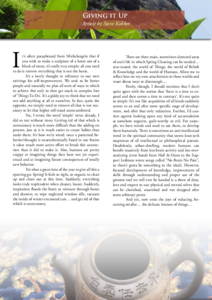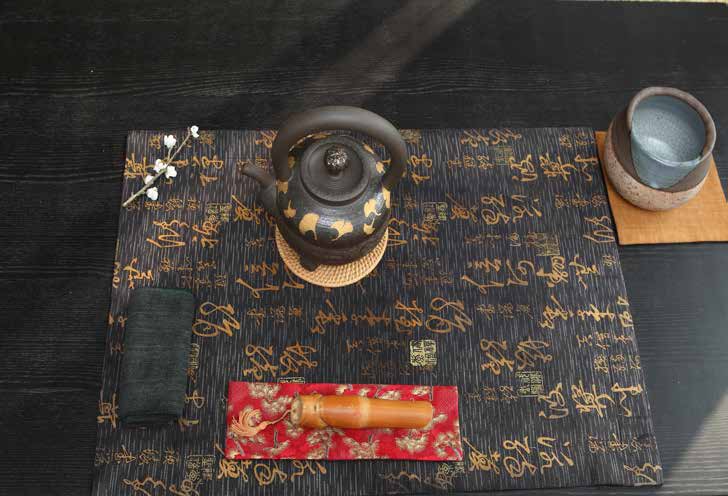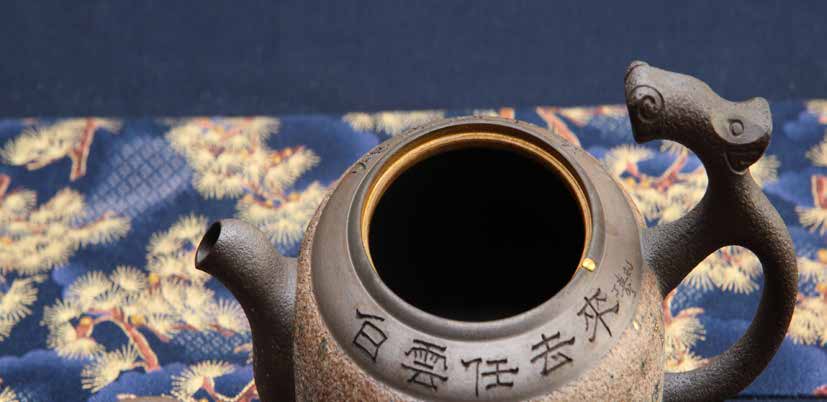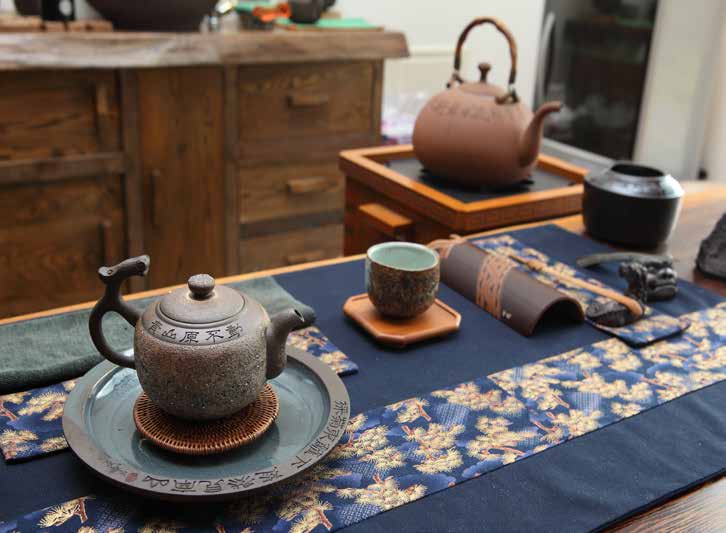
 |
|
It's often paraphrased from Michelangelo that if you wish to make a sculpture of a horse out of a block of stone, it's really very simple: all you need to do is remove everything that is not the horse.

It's a lovely thought in reference to our own strivings for self-improvement. We seek to be better people and naturally we plan all sorts of ways in which to achieve this only to then get stuck in complex lists of 'Things To Do'. It's a giddy joy to think that we need not add anything at all to ourselves. In fact, quite the opposite, we simply need to remove all that is not necessary to let that higher self stand unencumbered.
Yes, I wrote the word 'simple' twice already. I did so not without irony. Getting rid of that which is unnecessary is much more difficult than the adding on process, just as it is much easier to create habits than undo them. It's how we're wired: once a patterned behavior/thought is neurochemically fused in our brains it takes much more active effort to break this connection than it did to make it. Also, humans are pretty crappy at imagining things they have not yet experienced and at imagining future consequences of totally new behavior.
Yet what a great time of the year to give all this a sporting go: Spring! It feels so right, so organic to clean up and clean out at this time. Suddenly, everything looks truly resplendent when cleaner, leaner. Suddenly, inspiration floods the brain to winnow through boxes and drawers, to wipe neglected window sills, vacuum the inside of winter-encrusted cars... and get rid of that which is unnecessary.
There are three main, sometimes cluttered areas of one's life in which Spring Cleaning can be needed... year-round: the world of Things, the world of Beliefs & Knowledge and the world of Humans. Allow me to reflect here on my own attachments to these worlds and muse about ways to disentangle...
Firstly, though, I should mention that I don't quite agree with the notion that 'there is a time to expand and then comes a time to contract'. It's not quite so simple. It's not like acquisition of all kinds suddenly comes to an end after some specific stage of development, and after that only reduction. Further, I'd caution against looking upon any kind of accumulation as somehow negative, guilt-worthy or evil. For example, we have minds and need to use them, to develop them humanely. There is sometimes an anti-intellectual trend in the spiritual community that seems knee-jerk suspicious of all intellectual or philosophical pursuit. Doubtlessly, urban-dwelling, modern humans can benefit massively from less brain activity and less overanalyzing (even bands from Hall & Oates to the Support Lesbians wrote songs called "No Brain No Pain", so there's gotta be something to the idea!). However, focused development of knowledge, improvement of skills through understanding and proper use of the greatest tool we will ever be handed is a show of duty, love and respect to our physical and mental selves that can be cherished, nourished and not dropped after some arbitrary point.
And yet, now onto the joys of reducing, becoming smaller... the delicate lessness of things...

I've had a collector's mentality for as long as I can remember. And hey, I wasn't a collector of junk, no way! I collected really cool items! Heavily into all things antique in my teens, I collected old objects with signs of splendid decay: old books (no matter their content, as long as their bindings were crinkled brown and dusty), worn, old photographs (posed groups photos from 1880s-1930s were my favorites); later I had an enviable mini collection of American religious kitsch items (the 3D Last Supper wall ornament and Jesus candle were among my favorites); I liked 1970s TVshow-themed board games (envious were the eyes that beheld my Bionic Woman Game) and memorabilia (you can imagine my joy at discovering, in a post-Soviet market, a Farrah Fawcett shampoo bottle); vinyl-wise I was crazy about everything from Ghostly Sound Effects to Obscure Ukrainian Marches, with protracted stops on the way for disco, electronica and Glenn Gould; and books, well, I collected everything I could about the Pre-Raphaelites, William Morris, and anything at all to do with the history of cinema or photography and the occult. I was also the de facto historian of my extended family and collected my grandparents' memorabilia alongside my self-generated ones too (photos by the thousands, videos in the hundreds of hours...)
By the time I moved away from Canada, I had two truck-loads worth of "Very Interesting Stuff" to store: some 3000 records/CDs, 2000 books and endless boxes of trinkets - from a 1950s wooden school desk to clippings from my first haircut. It has taken me many years to reduce this amount by 90% (and endless hours on Ebay and Amazon. At least others have appreciated my eccentricities to the tune of some $10,000. One rare book alone I sold for $1100, and these sales allowed me to live the life of a lowly, traveling journalist for a few years).
I realized at some point that 'things' are part of my karma in this life, specifically the proper dispensing of them (not just tossing them out but finding a good, new home for them). I have learned a deep respect for the material world all the while gradually disentangling myself from the automatic desire to collect and possess.
I've also learned that 'cleaning out' is never just a case of good sorting and throwing out skills; it is more about not bringing in extra items into your life in the first place. It's very easy to buy some interesting item, and there is always justification for doing so, but I remind myself now when contemplating any purchase: this thing represents future time, effort and expense - it might break and need repair, or it will have to be moved from one place to another, cleaned, attended to, put away, disposed of or carted away to someone else or brought to some landfill. Is this item worth the future expenditure of time and effort? Sometimes yes, and I take it with me (hopefully with some awareness), but often it definitely is not worth the effort and it stays where it is. This is still an ongoing process for me, but I've made progress, and wow, does wide-open space in my apartment feel great!

We are a curious sort, us humans. Literally. We need to wonder in awe, to ask why and seek explanations. A beautiful quality. Yet the acquisition of knowledge gets tied to the entrenching of belief systems and patterned ways of responding to the external world. In our pursuit of new knowledge we often abandon our initial curiosity and become satisfied with an illusion of knowing and the comfort of repeating over and over again habitual behaviors and ways of responding.
Separating the wheat from the chaff is more difficult here than in the world of things. Our beliefs and how they guide our lives are less obvious to us; our pursuit of knowledge seems to be unquestionably a positive thing. Giving these things up is tricky. Knowing when to stop reading every book about a certain subject, to stop turning the pages and start living is a mini-art-form in and of itself. Seeing how we close ourselves to what's around us behind a veil of our knowledge-backed beliefs is the beginning of a high level of non-attachment.
I don't recall how I started this, but as a young kid I somehow got the notion of trying to 'believe without believing' in things. If I felt my brain making a judgment, I'd experiment with not believing it at the same time as I believed it. Somehow I got the idea (probably from one of those dusty old books) to think the opposite of any thought which came into my head and see if I could find any truth in that as well. If I heard myself think, 'Oh that's good, or bad,' I'd think the opposite just for fun and see if that was also true to some extent. The damnable thing was that there was always truth to be found in the exact opposite of my stated belief, no matter how firmly I really thought it to be true.
I recall, for example, loathing to go to big parties or events where there were lots of other kids around, like children's Christmas parties organized by my mom's workplace where we all had to straddle Santa's knees and be cute. I would repeat to myself, "I don't want to go! It'll be boring and I'll hate it!" I tried out the opposite: "I do want to go. It'll be interesting and I will enjoy it." At first I grumbled but then remembered previous times when I was dreading something and it turned out to be great; there was nothing inherently dread-worthy about this event, and my anxiety over it was weakened. Byron Katie would have been proud of me.
I practiced this kind of 'maybe it's true, maybe it's not' thinking for many years... and then forgot about it as I plunged into life from University on, and collected many rigid thinking patterns which I became, unbeknownst to myself, attached to. Only in recent years have those early lessons returned to play a soothing role. Trying to accommodate the opposite of whatever thought the brain generates is one great practice. Anything which breaks patterns and shifts perspectives can be helpful, for example, the technique of doing things which one is not used to doing, even trivial things, is amazingly helpful at retaining flexibility of mind and spirit (for some cool suggestions, check out www.theundolist.com).

For me, by far the hardest of all to trim out of life are extra persons. Even that line sounds incredibly harsh to me. Maybe it's my years of psychology and social work training. Maybe it's because at the age of 13 I thought, "If I were to die now, well, I wouldn't want to, but it wouldn't be that bad as my life hasn't been wasted - I've helped some people." Yup, a bleeding heart with a tendency of placing other people's (perceived/ imagined) needs well above my own. A familiar story, really.
With the unexamined motto of 'help others at all costs' as one's raison d'etre, one cannot then ever say no to others. This has resulted in hundreds of hours of telephone conversations where, even after an hour of steady listening, offering advice and saying, 'hmmm, oh-ho," I've been unable to say, "Ok, well, gotta go now," instead. They needed to talk, after all. Always a dangerous territory to enter: assuming what other people need. It can be kind and sweet and other-focused to be attuned to other people's needs. But it can also be the height of arrogance ("I know what they need..."), arise from self-importance ("...and I know how to give it") and lead down murky pathways (people often hope you have what they think they need but can turn away or even turn nasty when they realize you don't).
Best to stay away from others? Certainly not. Best to never be of support and assistance? Certainly not. We all need and benefit from that. Wu De reminds us that we are here to serve. Indeed. Yet not blindly and higgledy-piggeldy. To serve wholly also necessarily implies that one's time must not be wasted on energydraining or time-swallowing activities, including social ones. What's wrong with meeting friends, chillaxing, bonding? Nothing necessarily, but if we were to take a hard look at what we do, for how long and with whom in our lives, we'd see that quite a bit of that socializing is not only extraneous for us and them but also gets in the way of the progress we keep saying we wish to make.
A decision to do one thing is in itself an active decision not to do another. By doing this, we are actively choosing not to do that... so later we cannot fret that we have no time to do that. Often we continue meeting people long after our karmas have come together and walked their paths together out of habit, a sense of duty, guilt, or out of an avoidance of doing something more challenging with our time.
Once we become more certain of our particular life direction, with a deeper sense of what we need to do, and stripped of self-illusions, many aspects of our former selves naturally and easily fall away: things, rigid belief structures, and people. We no longer play with the same people we did at five or fifteen years old, right? That we don't says nothing bad about them. Just that our time to walk down a common path together has ended and that we have both moved on, enlightened and perhaps wiser by our having spent important time together. It can be incredibly hard to part ways when one person does not recognize the need to do so, but in the end it can be much more costly to continue a relationship which has outrun its course and which leaves no free room for others to move in for the next dance. Oof! As usual, I have been long-winded and yet only said one-fifth of what I could about this massive subject. I shall likely tackle Giving Up another time, as I myself continue to learn more the value of what Laozi already wrote long ago in the Dao De Jing, verse 48 (another paraphrasing): the worldly person devoted to learning seeks to gain something every day; the person devoted to the Dao seeks each day to give something up.
